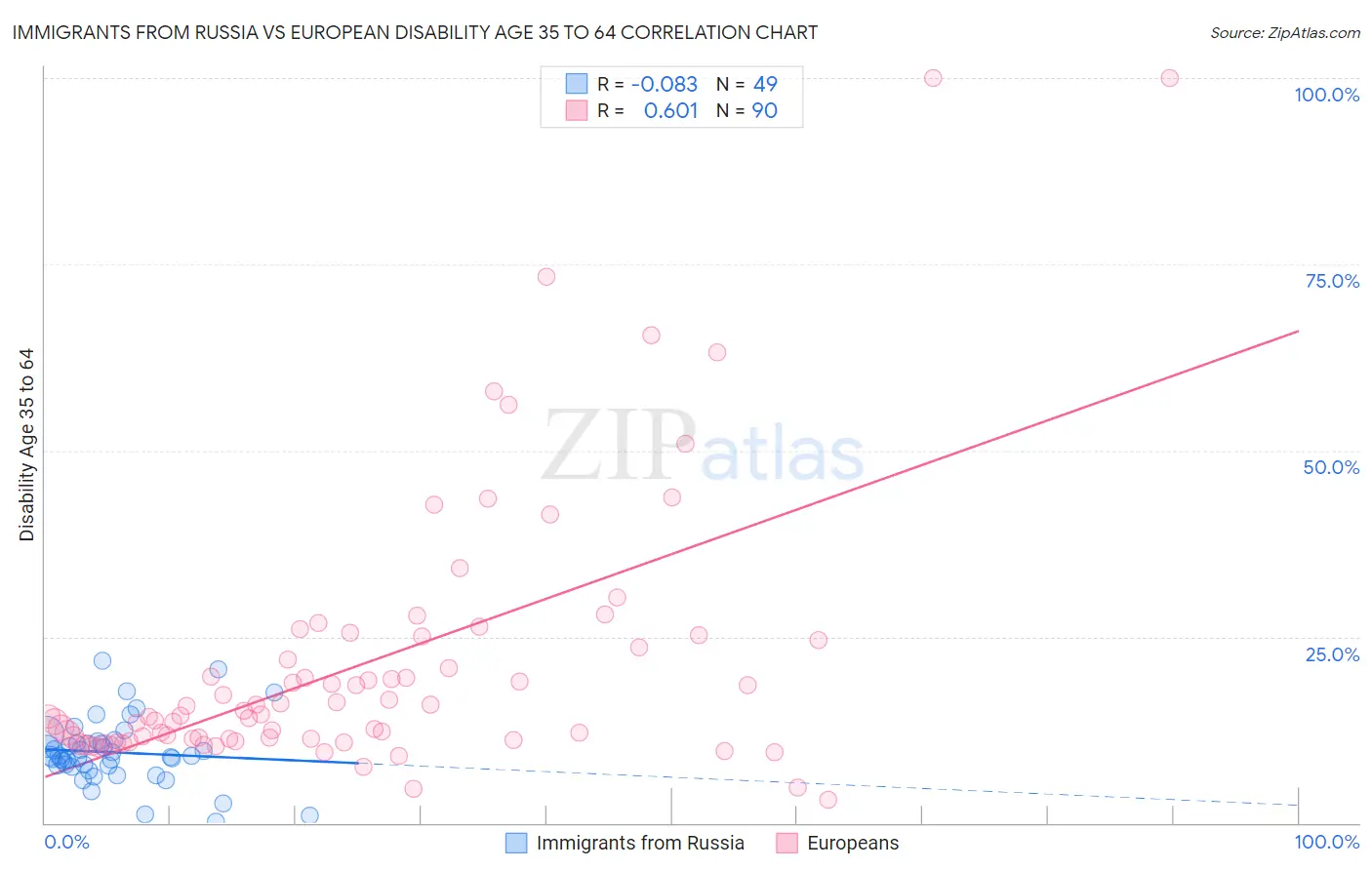Immigrants from Russia vs European Disability Age 35 to 64
COMPARE
Immigrants from Russia
European
Disability Age 35 to 64
Disability Age 35 to 64 Comparison
Immigrants from Russia
Europeans
9.8%
DISABILITY AGE 35 TO 64
99.8/ 100
METRIC RATING
54th/ 347
METRIC RANK
11.7%
DISABILITY AGE 35 TO 64
13.5/ 100
METRIC RATING
209th/ 347
METRIC RANK
Immigrants from Russia vs European Disability Age 35 to 64 Correlation Chart
The statistical analysis conducted on geographies consisting of 347,694,203 people shows a slight negative correlation between the proportion of Immigrants from Russia and percentage of population with a disability between the ages 34 and 64 in the United States with a correlation coefficient (R) of -0.083 and weighted average of 9.8%. Similarly, the statistical analysis conducted on geographies consisting of 560,896,486 people shows a significant positive correlation between the proportion of Europeans and percentage of population with a disability between the ages 34 and 64 in the United States with a correlation coefficient (R) of 0.601 and weighted average of 11.7%, a difference of 18.7%.

Disability Age 35 to 64 Correlation Summary
| Measurement | Immigrants from Russia | European |
| Minimum | 0.20% | 3.2% |
| Maximum | 21.8% | 100.0% |
| Range | 21.6% | 96.8% |
| Mean | 9.5% | 21.5% |
| Median | 9.0% | 14.5% |
| Interquartile 25% (IQ1) | 7.6% | 11.2% |
| Interquartile 75% (IQ3) | 10.9% | 24.6% |
| Interquartile Range (IQR) | 3.2% | 13.4% |
| Standard Deviation (Sample) | 4.4% | 18.3% |
| Standard Deviation (Population) | 4.3% | 18.2% |
Similar Demographics by Disability Age 35 to 64
Demographics Similar to Immigrants from Russia by Disability Age 35 to 64
In terms of disability age 35 to 64, the demographic groups most similar to Immigrants from Russia are Taiwanese (9.8%, a difference of 0.040%), Peruvian (9.9%, a difference of 0.060%), Immigrants from Bulgaria (9.8%, a difference of 0.090%), Bhutanese (9.8%, a difference of 0.11%), and Paraguayan (9.8%, a difference of 0.19%).
| Demographics | Rating | Rank | Disability Age 35 to 64 |
| Immigrants | Belgium | 99.8 /100 | #47 | Exceptional 9.8% |
| Immigrants | Serbia | 99.8 /100 | #48 | Exceptional 9.8% |
| Immigrants | Greece | 99.8 /100 | #49 | Exceptional 9.8% |
| Paraguayans | 99.8 /100 | #50 | Exceptional 9.8% |
| Bhutanese | 99.8 /100 | #51 | Exceptional 9.8% |
| Immigrants | Bulgaria | 99.8 /100 | #52 | Exceptional 9.8% |
| Taiwanese | 99.8 /100 | #53 | Exceptional 9.8% |
| Immigrants | Russia | 99.8 /100 | #54 | Exceptional 9.8% |
| Peruvians | 99.8 /100 | #55 | Exceptional 9.9% |
| South Americans | 99.8 /100 | #56 | Exceptional 9.9% |
| Colombians | 99.8 /100 | #57 | Exceptional 9.9% |
| Armenians | 99.8 /100 | #58 | Exceptional 9.9% |
| Immigrants | Sweden | 99.7 /100 | #59 | Exceptional 9.9% |
| Immigrants | South America | 99.7 /100 | #60 | Exceptional 9.9% |
| Immigrants | Spain | 99.7 /100 | #61 | Exceptional 10.0% |
Demographics Similar to Europeans by Disability Age 35 to 64
In terms of disability age 35 to 64, the demographic groups most similar to Europeans are Belgian (11.7%, a difference of 0.070%), Canadian (11.7%, a difference of 0.080%), Guatemalan (11.7%, a difference of 0.19%), Native Hawaiian (11.7%, a difference of 0.22%), and Ghanaian (11.7%, a difference of 0.22%).
| Demographics | Rating | Rank | Disability Age 35 to 64 |
| Immigrants | Guatemala | 17.5 /100 | #202 | Poor 11.6% |
| British | 17.0 /100 | #203 | Poor 11.6% |
| Nigerians | 16.3 /100 | #204 | Poor 11.6% |
| Slavs | 15.5 /100 | #205 | Poor 11.7% |
| Native Hawaiians | 14.8 /100 | #206 | Poor 11.7% |
| Ghanaians | 14.8 /100 | #207 | Poor 11.7% |
| Guatemalans | 14.6 /100 | #208 | Poor 11.7% |
| Europeans | 13.5 /100 | #209 | Poor 11.7% |
| Belgians | 13.1 /100 | #210 | Poor 11.7% |
| Canadians | 13.0 /100 | #211 | Poor 11.7% |
| Immigrants | Jamaica | 11.8 /100 | #212 | Poor 11.7% |
| Yugoslavians | 11.6 /100 | #213 | Poor 11.7% |
| Immigrants | Sudan | 11.4 /100 | #214 | Poor 11.7% |
| Spanish American Indians | 11.1 /100 | #215 | Poor 11.7% |
| Bahamians | 10.7 /100 | #216 | Poor 11.8% |